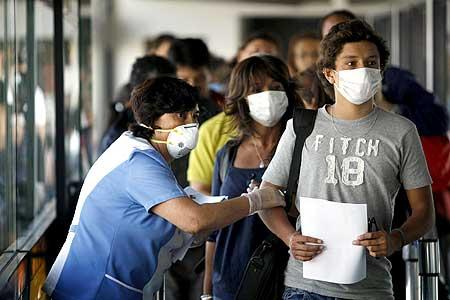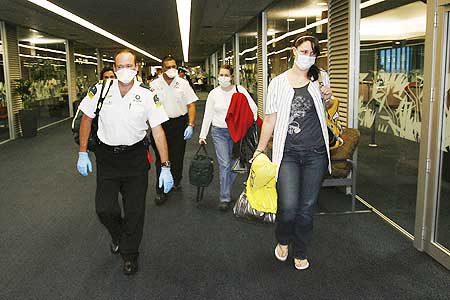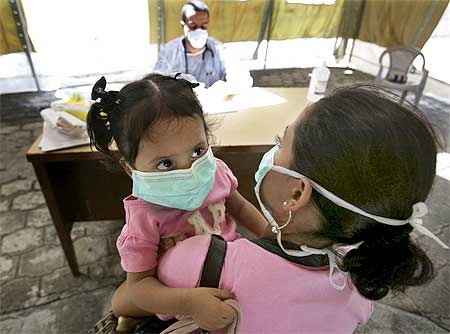Photographs: Ivan Alvarado/Reuters
The World Health Organisation on Thursday declared the swine flu outbreak was a pandemic, the first in more than 40 years.
The announcement was scientific confirmation that a new flu virus has emerged and is quickly circling the globe.
It will trigger drug companies to speed up production of a vaccine and prompt governments to devote more money to containing the virus.
Last month, several countries urged WHO not to declare a pandemic, its highest alert level and essentially raising the outbreak's status to a worldwide epidemic, fearing it would spark mass panic.
Prescribed precautions
Image: Women wearing protective masks visit the Yushima Tenjin shrine in Tokyo on May 24Photographs: Kim Kyung-Hoon/Reuters
WHO appealed to the people across the world to follow a few precautions.
DOs
Wash your hands
Avoid crowded places
Stay more than one arm's length distance from persons sick with flu
Get plenty of sleep
Drink plenty of water and eat nutritious food
DO NOTs
Shake hands or hug in greeting
Spit in public
Take medicines without consulting a physician
Other Suggestions
If you are sick, stay home and limit contact with others as much as possible.
Rest and take plenty of liquids
Cover your mouth and nose when you cough or sneeze
Seek medical advice if needed
WHO said it is safe to eat well-cooked pork
What is swine flu? What are its symptoms?
Image: A St. John's medical team escorts a couple, after they showed signs of the fluPhotographs: Greg Bowker/New Zealand Herald/Pool/Reuters
Swine influenza (also called swine flu, hog flu, and pig flu) is an infection of a host animal by any one of several specific types of microscopic organisms called "swine influenza virus".
A swine influenza virus (SIV) is any strain of the influenza family of viruses that is usually hosted by pigs. As of 2009, the known SIV strains are the influenza C virus and the subtypes of the influenza A virus known as H1N1, H1N2, H3N1, H3N2, and H2N3.
Swine influenza is common in pigs in the mid-western United States, Mexico, Canada, South America, Europe (including the United Kingdom, Sweden, and Italy), Kenya, China, Taiwan, Japan and other parts of eastern Asia.
In humans, the symptoms of swine flu are similar to those of influenza and of influenza-like illness in general, namely chills, fever, sore throat, muscle pains, severe headache, coughing, weakness and general discomfort.
The 2009 swine flu outbreak in humans is due to a new strain of influenza A virus subtype H1N1 that contains genes closely related to swine influenza. The origin of this new strain is unknown.
However, the World Organisation for Animal Health reports that this strain has not been isolated in pigs. This strain can be transmitted from human to human, and causes the normal symptoms of influenza.
The pandemic spreads across the world
Image: A doctor talks to a mother before testing her child in NicaraguaPhotographs: Oswaldo Rivas/Reuters
74 countries have officially reported 27,737 cases of influenza A(H1N1) infection, including 141 deaths.
The largest number of laboratory confirmed cases of the disease as officially reported by the WHO has been found in the United States of America with 13,217 confirmed cases, amounting to 27 deaths.
In Mexico, where the pandemic originated in April, has the most deaths with 106.
Currently, Chile has witnessed the largest number of newly confirmed swine flu cases with 1,283 cases, resulting in one death.
Swine flu in India
Image: Children hold placards as they take part in a H1N1 flu awareness rally in HyderabadPhotographs: Krishnendu Halder/Reuters
In India, two more cases of swine flu were reported on Thursday, escalating the total number of cases to 14, officials in New Delhi noted.
In New Delhi, a 41-year-old woman who arrived from New York on June 5 has been tested positive, while in Goa, a man came from London via Germany has been found affected.
New Delhi on Wednesday got its third case of swine flu with a person who has returned from Boston recently testing positive for the virus. The result for the latest case was positive, National Institute of Communicable Diseases Director Shivlal said.
The test results are awaited for five other persons who have reported swine flu symptoms -- two in Mumbai and three in Delhi, a senior health ministry official said.
All of them have been placed in isolation wards at designated health facilities, he added.
With the numbers of affected increasing, Union Health Minister Ghulam Nabi Azad on wrote to External Affairs Minister S M Krishna, urging that swine flu-affected countries should be advised 'to screen outbound travellers at airports'.
What is 'pandemic'?
Image: A staff member detects a woman arriving at a Singapore hospitalPhotographs: Vivek Prakash/Reuters
The term pandemic, (derived from Greek words 'pan' meaning all and 'demos' meaning people) is an epidemic of infectious diseases that spreads through populations across a large region, for instance a continent, or even worldwide.
According to the WHO, a pandemic can start when three conditions have been met. Firstly, it should be an emergence of a disease new to a population. Secondly, the agents infect humans, causing serious illness. And thirdly, agents spread easily and sustainably among humans.
The last pandemic the world saw was the Hong Kong flu, which killed an estimated one million people worldwide during 1968-69. The pandemic infected approximately 500,000 Hong Kong residents, 15 percent of the population, with a low death rate. In the United States, approximately 33,800 people died.







article